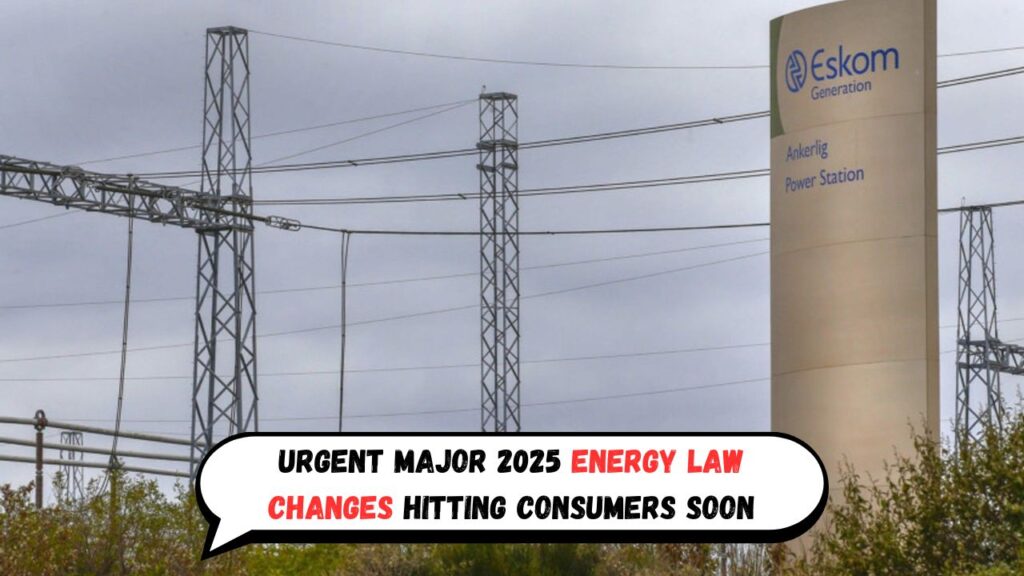South Africa’s 2025 Electricity Law Overhaul: The upcoming changes in South Africa’s electricity regulations are poised to significantly impact consumers throughout the nation. As the government prepares for a comprehensive overhaul of the electricity laws by 2025, citizens are eager to understand what these changes might entail. The reform aims to address the ongoing energy crisis, enhance sustainability, and improve service delivery. This initiative will not only reshape the legal framework governing electricity but also influence consumer costs, reliability, and access to power. With the nation’s growing demand for electricity and the escalating challenges of power shortages, this overhaul is seen as a crucial step toward a more stable and efficient energy sector.

Transformative Aspects of South Africa’s 2025 Electricity Law
The 2025 overhaul of South Africa’s electricity laws is expected to introduce several transformative aspects that will redefine the energy landscape. One of the primary goals is to diversify the energy mix, reducing reliance on traditional coal-fired power plants. This will be achieved by increasing investments in renewable energy sources such as wind, solar, and hydropower. By promoting green energy, the government seeks to align with global environmental standards and reduce carbon emissions, contributing to a cleaner and healthier environment. Additionally, the new regulations will focus on decentralizing the power generation sector, encouraging independent power producers (IPPs) to play a more significant role. This move aims to foster competition, drive down prices, and improve service delivery to consumers. Furthermore, the law will likely introduce more stringent measures to mitigate load shedding, ensuring a more reliable supply of electricity. These changes promise to not only stabilize the energy sector but also stimulate economic growth by attracting foreign investments and creating job opportunities within the renewable energy industry.
Impact on Consumers: Cost and Accessibility
For South African consumers, the 2025 electricity law overhaul holds the potential for both challenges and opportunities, particularly in terms of cost and accessibility. While the shift towards renewable energy sources might initially require significant upfront investment, the long-term benefits could include reduced electricity tariffs and more predictable pricing. As the market becomes more competitive with the entry of independent power producers, consumers may enjoy better service quality and more choices when it comes to their energy providers. Moreover, the focus on improving grid infrastructure and reducing load shedding is expected to enhance the reliability of electricity supply, minimizing disruptions that have been a major concern for households and businesses alike. However, there is also the possibility of increased costs during the transition period as new systems are put in place. The government will need to implement measures to protect vulnerable consumers from potential price hikes and ensure equitable access to electricity across different regions. By addressing these concerns, the overhaul seeks to create a more balanced and consumer-friendly electricity market.
Environmental Benefits of the 2025 Electricity Law Overhaul
The environmental implications of South Africa’s 2025 electricity law overhaul are significant, marking a crucial step towards sustainability. By prioritizing renewable energy sources, the new regulations aim to drastically reduce the nation’s carbon footprint. This shift is expected to contribute to global efforts in combating climate change while promoting a healthier living environment for South Africans. The transition to cleaner energy sources will also reduce air and water pollution, which are often byproducts of coal-fired power stations. Consequently, there will likely be a positive impact on public health, with fewer respiratory illnesses and other pollution-related health issues. Moreover, the focus on environmental sustainability is anticipated to drive innovation in the energy sector, fostering the development of new technologies and practices that will further enhance efficiency and reduce waste. As South Africa positions itself as a leader in renewable energy within the region, it could also inspire neighboring countries to adopt similar environmentally-friendly policies, amplifying the positive impact on the continent’s ecological footprint.
Challenges and Future Outlook for South Africa’s Energy Sector
While the 2025 electricity law overhaul presents numerous opportunities for growth and improvement within South Africa’s energy sector, it also comes with its own set of challenges. One of the primary concerns is the need for substantial investment in infrastructure and technology to support the transition to renewable energy. This includes upgrading the national grid to accommodate a diverse range of energy sources and ensuring that storage solutions are in place to manage the intermittent nature of renewable energy. Additionally, there is a pressing need to develop a skilled workforce capable of operating and maintaining new technologies. The government will need to invest in education and training programs to prepare the current and future workforce for these changes. Furthermore, navigating the political and economic complexities of such a large-scale reform requires careful planning and collaboration between public and private sectors. Despite these challenges, the future outlook for South Africa’s energy sector is optimistic. By embracing innovative solutions and fostering a collaborative approach, the nation is well-positioned to achieve energy security, economic growth, and environmental sustainability in the years to come.



